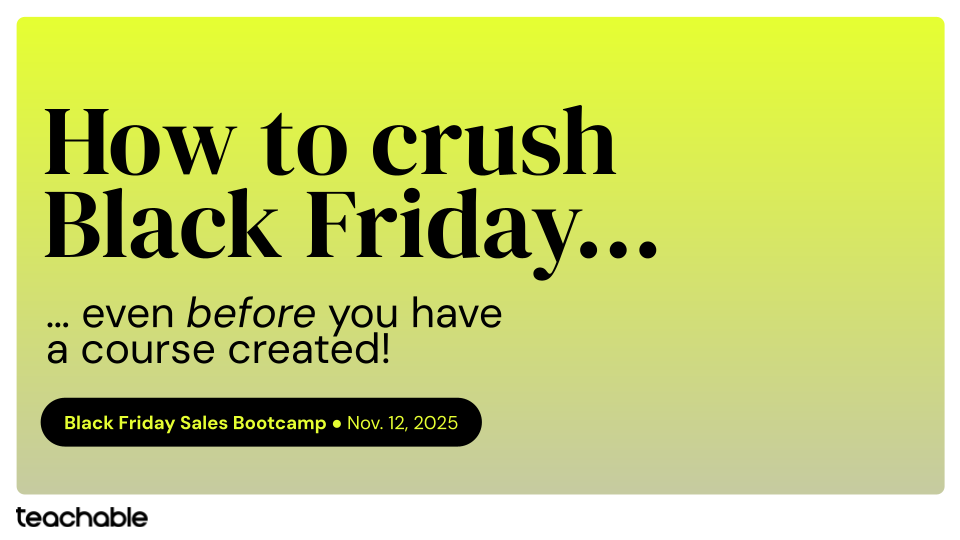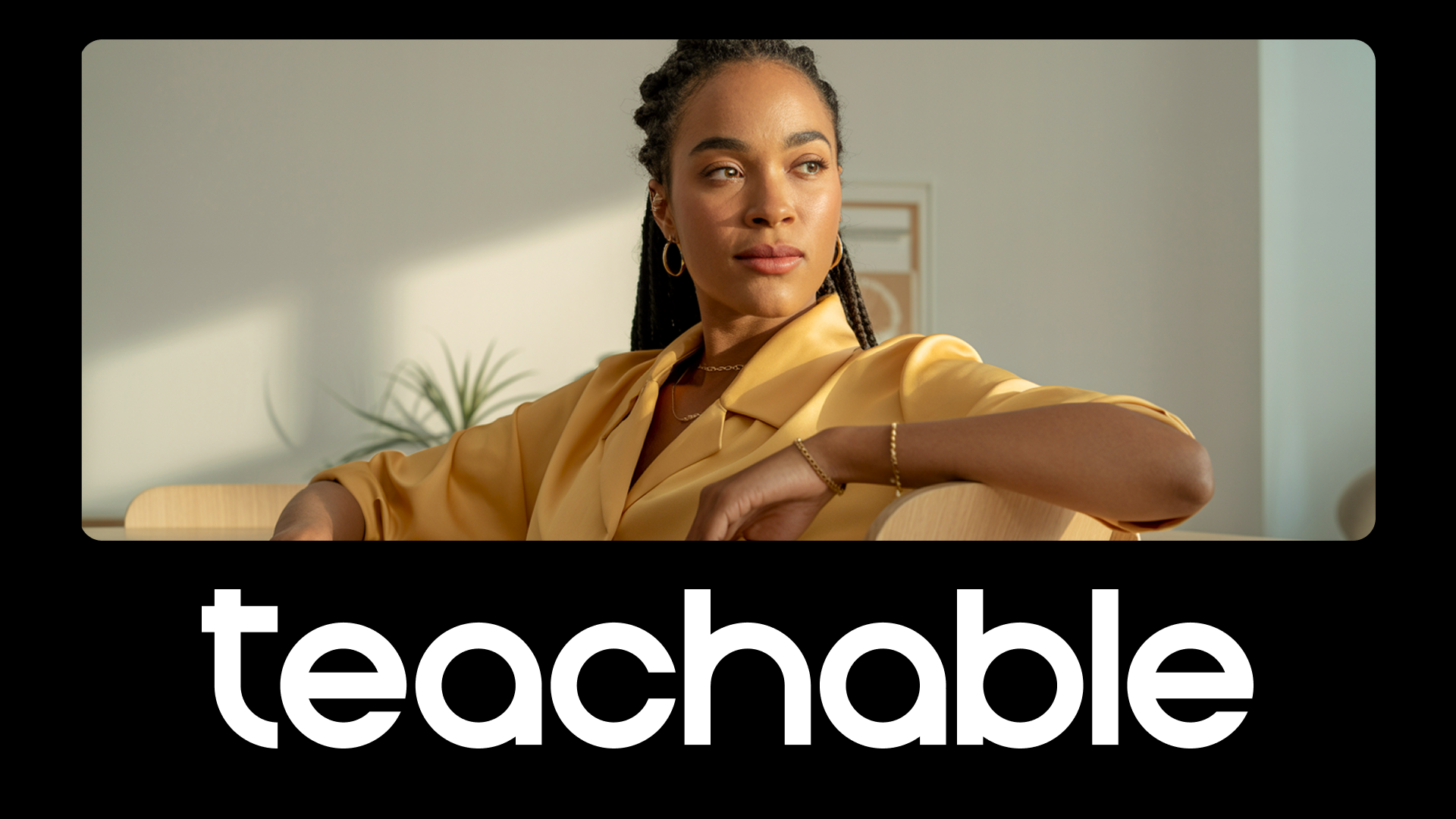The following is a guest video from Teachable creator, Darnell Brown. Darnell is an award-winning certified brand strategist and educator. He helps today’s leaders and experts save time and impact lives through brand clarity, empathy, and strategy. His clients include BAND-AID, Passport Parking, & /dev/color. In honor of Teachable’s Creator Month, in which we celebrate and share the expertise of creators everywhere, Darnell shares his a tip all entrepreneurs need: how to sell without the sleaze.
Video transcript
Hey there! Darnell here with Bulletproof Hustle, certified brand strategist, educator, and consultant. So today, I’m going to show you how to sell without feeling sleazy or slimy—like we’ve all experienced before. Y’all know what I’m talking about, too, because you’ve probably been on the receiving end of a terrible sell—one that made you feel like they were trying to force you into buying something that you really didn’t want, right?
So the first point is that we have to realize how much we already sell. It’s inherent. It’s in our DNA. It’s in our nature to sell. Because anytime somebody has commented that you got a fly jacket or some dope kicks, and you were like: Hey, I got this from from this store, or this jacket has this buy one, get one free right now—you better go check that out.
You’re selling that brand. You’re selling that store. That’s word of mouth! Anytime somebody has come to you, and they’re like: You know, where would you recommend that I go get this service? And you’ve mentioned a place—you’re selling that service for them. Anytime that you’re trying to get your kids or your spouse to clean their rooms or get better grades for your kids. That is, you’re selling them on an idea. You’re trying to convince them to do something.
So we are already doing this day in and day out several times a day—pretty much anytime that we’re having a conversation. Me talking to you now is me trying to persuade you about what sales is. See what I’m saying? And so, anytime there’s an exchange of ideas, or you’re trying to get someone to buy into what you’re selling—like your opinion, or your idea, your viewpoint—that’s sales.
So that’s the first part: already realizing that you’re doing it, and how comfortable that you are. You didn’t even realize it!
The second point is that sales really is a game of persuasion and convincing someone to take an action. When your motives are altruistic or you’re trying to get someone to do something that’s going to be good for them, that is the most optimal version of persuasion—using it as a force for good.
Sales really is persuasion. It’s really about getting someone to take an action that they otherwise wouldn’t have took, but it’s going to benefit them. And it’s probably it could benefit them immediately or in the long run. But either way, this is something that they might not even know that they need or want, but when they get it, they might not ever be able to live without it again.
In persuading people and shifting away from sales—the art of persuasion, the back and forth—then you’re looking at any compensation or any reviews or testimonials that you get as a reward, right. If someone pays you for what you’ve done to persuade them to take an action, then that’s more of a transaction at that point. That’s dealing within the world of commerce a little bit more, right. But anytime there’s an exchange to some degree, then that’s when it becomes a more transactional thing. When it’s just you persuading someone to take an action, that’s when it is more about sales.
And then finally, that third point is that you have to get comfortable with being intentional about selling since you’re already doing it for other brands all the time. All brands that you like and love—anytime that you’ve recommended or referred someone, you’ve done some selling. When it comes to you as an entrepreneur or business owner, and you feel like you’re not the sales-y type or you’re not a natural salesperson, you got to get away from that thinking.
The way to get away from that thinking, the secret to it, is to look at it as though you’re doing your audience a disservice by not giving them something that they need. You’re hoarding it inadvertently. You’re trying to perfect something that will never be perfect. It’s progress over perfection. But, your intended audience could be using that thing! It could be improving their lives.
The more you hoard it or get shy about it or don’t feel comfortable in your own skin, someone else is selling them an inferior product. Someone else is selling them in inferior service—probably putting so much more dirt on the game in your industry.
So the sooner that you get out there with this unbelievable thing that you have, and the sooner that you get comfortable with pitching it, the better off we’ll all be because we might need and want that thing and not quite be able to realize it or articulate it perfectly just yet. But we’ll know it when we see it! And we will realize, ‘OK, that person is thorough. They’re real. I’m happy to buy from them.’
The last thing I’ll say is a simple example that we probably all can relate to is many of us don’t like getting on camera. Or we don’t like being in webinars and presenting ourselves. So if we are on a webinar, and we were invited there to pitch a free thing or help someone solve a problem, when it gets to that inevitable conclusion, and it’s time for an upsell, we feel a way about that. We don’t feel like that’s natural to us.
This is the perfect circumstance where you want to get out of that thinking and say:
‘OK, well, I’m doing them a disservice. I couldn’t share everything that I know in this webinar in the first place. There’s more to this story. There’s more to this journey. There’s more education to be had. So if I hold on to this, that student and these people are going to go elsewhere. And they’re probably going to get a lesser thing. It’s my duty at that point to keep this journey going on—to continue with where we are, where we can leave enough because it’s impossible to fit it all into this one thing at this time.’
You got to break stuff down, so look at it in that way. Those are the three big points! Just to recap, just to tie this whole thing together, y’all. Number one: We already sell all the time anyway. We do it day in and day out—anytime you’re having a conversation virtually.
Number two: Sales really is persuading. At least when we’re good and our intentions are solid, we’re really just persuading people! We’re getting someone to take an action. We’re trying to convince them and give them that extra nudge that they need to get them over that hurdle. And then finally: We have to get comfortable with it, because we’re doing a disservice to our audience every time that we hold on to it, and it could be out there into the world.
That’s what I want to leave you with today as you go on into your journey. And that’s how you sell without feeling sleazy. Thanks for watching.
Join more than 150,000 creators who use Teachable to make a real impact and earn a real income.


.png)
.png)



